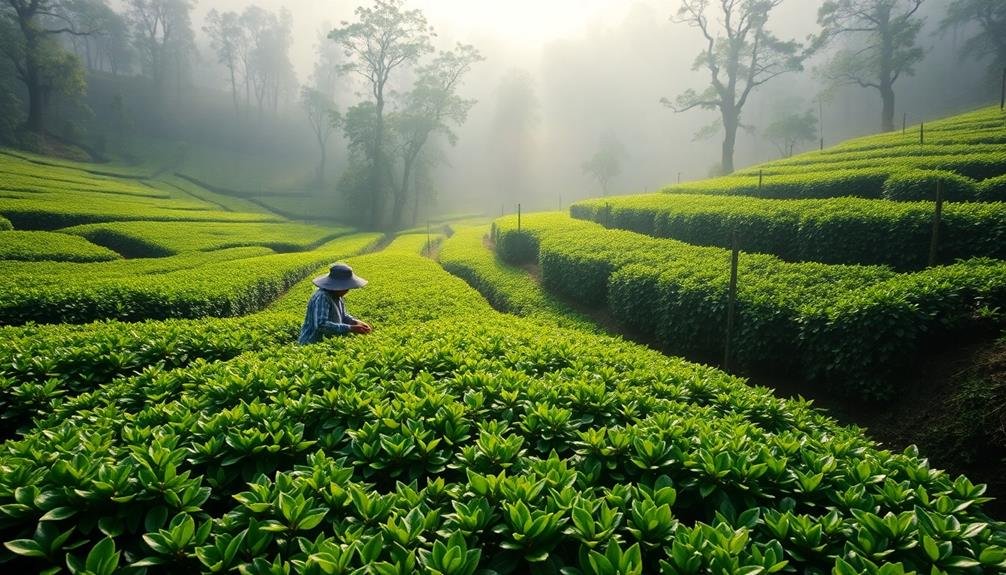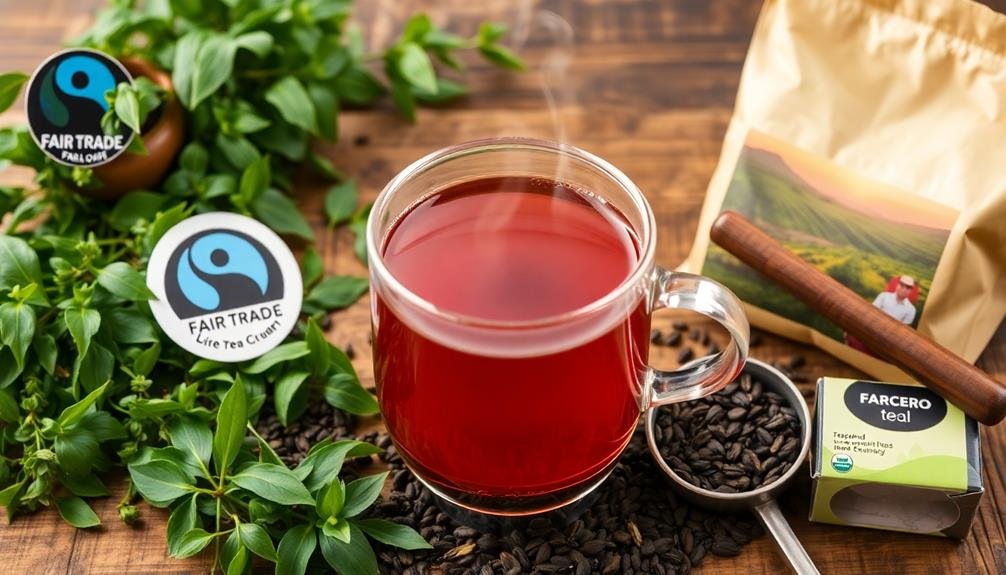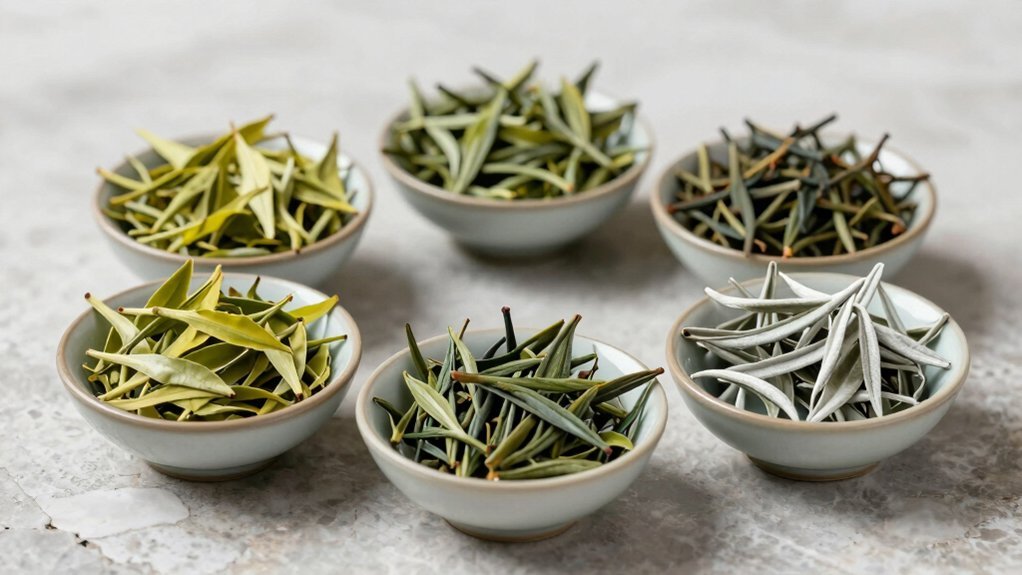To ethically source herbal tea ingredients, start by researching suppliers' farming practices, focusing on organic and sustainable methods. Prioritize Fair Trade certified suppliers to guarantee fair compensation for farmers and workers. Support local herb growers to reduce your carbon footprint and access fresher ingredients. Verify organic growing methods by requesting detailed information and visiting farms when possible. Finally, confirm sustainable harvesting techniques are used to maintain ecological balance. By following these tips, you'll contribute to a more ethical and sustainable herbal tea industry. Dive deeper to discover how these practices can transform your sourcing strategy.
Research Suppliers' Farming Practices

When sourcing herbal tea ingredients, it's important to thoroughly research your suppliers' farming practices. Start by examining their cultivation methods, focusing on organic and sustainable approaches. Look for suppliers who avoid synthetic pesticides and fertilizers, opting instead for natural alternatives that protect both the environment and the quality of the herbs.
Investigate their harvesting techniques to confirm they're not damaging the plants or surrounding ecosystems. Ethical suppliers often practice selective harvesting, which preserves plant populations and promotes biodiversity.
Pay attention to their water management strategies, as responsible suppliers will implement water conservation methods and protect local water sources from contamination.
Consider the labor practices employed by your potential suppliers. Seek out those who provide fair wages, safe working conditions, and opportunities for their workers.
Look for certifications such as Fair Trade or Rainforest Alliance, which indicate a commitment to ethical labor practices and environmental stewardship.
Prioritize Fair Trade Certification
Among the various certifications available, Fair Trade should be a top priority when sourcing herbal tea ingredients. This certification guarantees that farmers and workers in developing countries receive fair compensation for their products and labor. By choosing Fair Trade certified ingredients, you're supporting sustainable farming practices and improving the livelihoods of small-scale producers.
When seeking Fair Trade certified herbal tea ingredients, look for the official Fair Trade logo on packaging or supplier documentation. This symbol confirms that the product meets strict social, economic, and environmental standards.
You'll be supporting initiatives that promote gender equality, prohibit child labor, and invest in community development projects.
Don't hesitate to ask your suppliers about their Fair Trade certifications and the specific origins of their ingredients. Reputable suppliers will be transparent about their sourcing practices and can provide detailed information about the farmers and cooperatives they work with.
Support Local Herb Growers

Supporting local herb growers is another key aspect of ethically sourcing herbal tea ingredients. By prioritizing local suppliers, you're not only guaranteeing fresher ingredients but also reducing the carbon footprint associated with long-distance transportation.
Seek out nearby farms, community gardens, or small-scale growers who specialize in cultivating herbs for tea. Visit local farmers' markets or join community-supported agriculture (CSA) programs to connect directly with herb growers in your area. This allows you to build relationships, understand their growing practices, and guarantee fair compensation for their work.
You'll also have the opportunity to learn about unique, locally-adapted herb varieties that may not be available through larger suppliers. Consider partnering with local schools or community organizations to establish herb gardens. This can create educational opportunities and a sustainable source of ingredients.
If you're a tea business owner, offer to mentor aspiring herb growers or provide them with guaranteed purchase agreements to help them establish their operations. By investing in your local herb-growing community, you're fostering a more resilient and ethical supply chain for your herbal tea ingredients.
Verify Organic Growing Methods
To guarantee the ethical sourcing of herbal tea ingredients, it's crucial to verify organic growing methods. Start by researching the certifications and standards for organic farming in your region. Look for suppliers who hold valid organic certifications from recognized authorities. These certifications guarantee that herbs are grown without synthetic pesticides, chemical fertilizers, or genetically modified organisms.
Don't hesitate to ask suppliers for detailed information about their growing practices. Inquire about soil management, pest control methods, and water conservation techniques. Request documentation of their organic status and any additional eco-friendly practices they employ.
If possible, visit the farms or gardens where your herbs are grown. This firsthand observation will give you insight into the actual growing conditions and methods used.
Consider partnering with suppliers who practice regenerative agriculture, which goes beyond organic by focusing on soil health and biodiversity. Verify that your suppliers conduct regular soil tests and implement crop rotation to maintain soil fertility naturally.
Ensure Sustainable Harvesting Techniques

Once you've verified organic growing methods, it's time to focus on sustainable harvesting techniques.
Sustainable harvesting guarantees that the plants you're sourcing can regenerate and thrive in their natural habitats. It's vital to work with suppliers who understand and practice responsible harvesting methods to maintain ecological balance.
When sourcing herbal tea ingredients, ask your suppliers about their harvesting practices. Verify they're not over-harvesting or damaging the surrounding ecosystem. Look for suppliers who rotate harvesting areas, allowing plants to recover between harvests. They should also be knowledgeable about the best times to harvest each plant for maximum potency and minimal environmental impact.
Consider these key aspects of sustainable harvesting:
- Selective harvesting: Only taking mature plants and leaving younger ones to grow
- Proper tools: Using clean, sharp tools to minimize damage to plants
- Timing: Harvesting during the right season and time of day for each plant species
- Conservation: Leaving enough plants to maintain biodiversity and support local wildlife
Frequently Asked Questions
How Can I Determine the Shelf Life of Ethically Sourced Herbal Tea Ingredients?
You can determine the shelf life of herbal tea ingredients by checking expiration dates, examining color and aroma changes, researching typical storage times for each herb, and consulting with suppliers. Store them properly in airtight containers to maximize freshness.
Are There Specific Storage Requirements for Ethically Sourced Herbs and Tea Blends?
You'll need to store your ethically sourced herbs and tea blends in airtight containers, away from light, heat, and moisture. Keep them in a cool, dark place to maintain freshness and potency. Don't forget to label them properly.
What Are the Potential Health Benefits of Ethically Sourced Herbal Teas?
You'll find that ethically sourced herbal teas can offer numerous health benefits. They're often rich in antioxidants, may boost your immune system, aid digestion, reduce stress, and improve sleep quality. Some can even help with weight management.
How Do Ethically Sourced Herbal Teas Compare in Taste to Conventional Options?
You'll often find ethically sourced herbal teas taste fresher and more vibrant than conventional options. They're typically harvested at peak flavor and processed with care, resulting in a more authentic and nuanced taste experience you'll truly savor.
Can I Blend Ethically Sourced Herbs With Regular Tea Leaves for Custom Blends?
Yes, you can blend ethically sourced herbs with regular tea leaves for custom blends. It's a great way to create unique flavors and add variety to your tea collection. Experiment with different combinations to find your favorite mixes.
In Summary
You've now got the tools to source your herbal tea ingredients ethically. Remember to dig into suppliers' practices, look for Fair Trade certification, and support local growers. Don't forget to verify organic methods and sustainable harvesting. By following these tips, you're not just brewing a great cup of tea – you're supporting fair practices, protecting the environment, and ensuring the long-term sustainability of herbal tea production. Your choices matter, so sip responsibly!





Leave a Reply